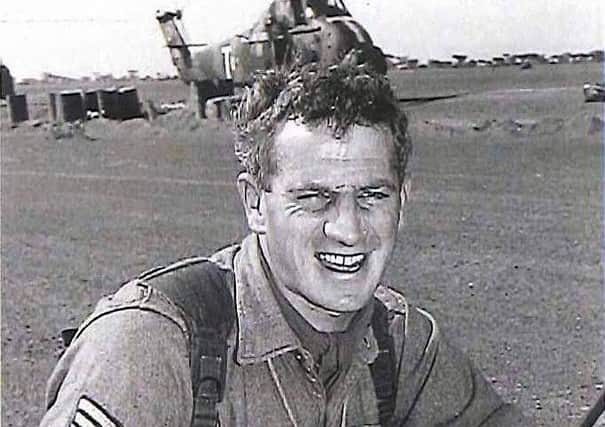Obituary: Sergeant John Whittle, soldier


Sergeant John Whittle, a Scots Guard who survived an IRA bomb attack in Belfast in 1971, has died peacefully in London. He was 73.
Whittle, from Vale of Leven in Dunbartonshire, was 29 when he was seriously wounded and lost his right eye.
Advertisement
Hide AdAdvertisement
Hide AdHis fellow soldier, Guardsman Brian Hall, 22, from Dunfermline, Fife, was killed in Cupar Street, off the Falls Road, when a bomb was planted by the Official IRA. Two other soldiers and two housewives passing the scene were also injured as the political situation worsened and the IRA stepped up their campaign to drive British troops out of Northern Ireland.
The army had taken over a three-storey house with the RUC and created a listening and observation post to cover the so-called Peace Line near the Springfield Road.
A high wall was later built there to keep apart the then warring Republican communities of the Falls Road and the Loyalist stronghold of Shankill Road.
It is believed that terrorists approached the army post along a back alley and forced a woman working in a baker’s shop into a car which they parked near the scene.
They then left a suitcase packed with 100lbs of gelignite on the floor of the shop against a wall next door to the army post.
A local grocery shop owner said: “The bomb exploded and the building collapsed like a pack of cards. It seemed no-one could come out alive.”
Sgt Whittle, who was educated at Vale of Leven Academy and served his time as a plumber with Duncan Rodger in Alexandria before deciding to join the Scots Guards, was taken to the Royal Victoria Hospital in Belfast.
A single man, he had been in the Guards for almost nine years at the time of the IRA incident and had served in Malaya, Borneo, Kenya and Sharjah, Persia.
Advertisement
Hide AdAdvertisement
Hide AdNorthern Ireland was a posting Sgt Whittle and most other service personnel did not want to receive at that time since Belfast was extremely dangerous, besieged by terrorists and blighted by tragedy and turmoil.
Sgt Whittle had been caught up in a number of near rifle shot misses and bomb explosions but with his fellow Scots Guards stuck bravely to the task of trying to keep the peace in one of the most dangerous parts of Belfast.
His mother, Lucy, and sister, Olga, were flown out from their home on Napierston Road, Bonhill, to see John in hospital.
An army spokesperson said: “Unfortunately, Sgt Whittle took most of the explosion on his head and has lost his right eye. He is now apparently well and sitting up in bed. His life is no longer in danger.”
His aunt, Mrs Elsa Thomson, expressed her concern about the safety of British troops caught up in the Troubles in Belfast at that time.
She said there appeared to be no prospect of an end to the violence and added: “The terrorists are killing soldiers, children and innocent people, and the army’s presence is not having the desired effect – peace.”
Even in the Royal Victoria Hospital, soldiers like John Whittle were not safe from terrorist gunmen.
When I went to the hospital to interview him, a Black Watch soldier from Stornoway, red hackle in his cap and automatic rifle clutched across his chest, stood guard at the injured sergeant’s bedside. Not even in hospital were soldiers safe to sleep peacefully as IRA gunmen wearing white overall coats and passing themselves off as medical staff had shot at least one of them in his hospital bed.
Advertisement
Hide AdAdvertisement
Hide AdWhen the Black Watch armed guard went off to inform a senior officer about a suspicious object smouldering in a litter bin in the Falls Road, just below the window of the ward, he passed his weapon to Sgt Whittle in the bed.
Despite having lost his eye, Sgt Whittle’s morale was at a peak. He told me: “I was lucky to get out with my life. Although I am due to leave the army in six months’ time, I won’t be quitting.”
The only place he wanted to get out of at that moment though was the hospital, where everyone was on edge, but he had to stay there until after an operation to remove fragments of glass from his body.
He said: “I’ve lost all my kit. All I am left with is my camera which, by some miracle wasn’t broken, and a pair of blood-stained boots.”
Sergeant Whittle kept to his pledge to stay on in the Scots Guards and took up duties as an army recruitment officer in Scotland before retiring and joining a company of commissionaires and concierges in London.
His friend and colleague, Kevin Gorman, paid tribute to him at Sgt Whittle’s funeral in Hendon, London, where he lived latterly in a care home.
He said that John Whittle had been a brave soldier, respected colleague and good friend who would be sadly missed by everyone connected with the Scots Guards.
His funeral was a dignified and moving service and Sgt Whittle’s coffin was draped with the Union Flag with his Scots Guard’s cap and belt on top. An army piper played a final farewell – “It was a fitting send-off for an old soldier,” said Kevin Gorman.
Advertisement
Hide AdAdvertisement
Hide AdSergeant Whittle never married and his parents, Lucy and Joseph, predeceased him, as did his sister, Olga.
A memorial service is being arranged Scots Guard colleagues to take place for Sergeant Whittle in Vale of Leven Cemetery at a later date and details for this will be announced in due course.